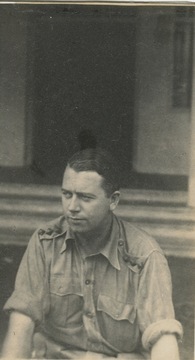CAHILL, Richard Lloyd
| Service Number: | NX35149 |
|---|---|
| Enlisted: | 5 June 1940 |
| Last Rank: | Captain |
| Last Unit: | 2nd/19th Infantry Battalion |
| Born: | Sydney, New South Wales Australia , 30 January 1914 |
| Home Town: | Bondi Junction , New South Wales |
| Schooling: | Not yet discovered |
| Occupation: | Medical Practitioner |
| Memorials: | Ballarat Australian Ex-Prisoners of War Memorial |
World War 2 Service
| 5 Jun 1940: | Enlisted NX35149, 2nd/19th Infantry Battalion | |
|---|---|---|
| 5 Jun 1940: | Promoted Australian Military Forces (WW2) , Captain, 2nd/19th Infantry Battalion | |
| 1 Jul 1940: | Involvement Australian Military Forces (WW2) , Captain, NX35149, 2nd/19th Infantry Battalion, Malaya/Singapore, Appointed Regimental Medical Officer of the 2/19 Battalion. | |
| 9 Nov 1945: | Discharged NX35149, 2nd/19th Infantry Battalion | |
| 22 Apr 1947: | Honoured Member of the Order of the British Empire, Malaya/Singapore |
Help us honour Richard Lloyd Cahill's service by contributing information, stories, and images so that they can be preserved for future generations.
Add my storyBiography contributed by John Baker
Captain Cahill's recommendation for the award of the Member of the British Empire (MBE).
"Capt. Cahill was a Prisoner of War in Japanese hands from Feb 42 to Aug 45. in 1943 after a long and arduous march from Bampong to working camps, (approx 200 miles) this officer found himself for three days at Shimo Sonkurai, the role of Medical Officer of the camp of 1850, later (2,000) men. In this intial difficult period he worked without ceasing, and in a very short time laid the foundation of a very satisfactory camp medical service. Cholera broke out within 24hours of the establishment of the camp: at first only a few cases occured, but when on 25/26 May 43 the epidemic suddenly broke out in a virulent form - 35 cases being recorded in 24hours - Capt Cahill was place in sole charge of cholera isolation section of the camp hospital, which consisted of bamboo stagings inadequately cover by leaking canvas. The contruction of these stages barely kept up with increasing number of patients so that the medical treatment had to be carried out under very great difficulty. Medical officers and orderlies worked in mud, slush, and incessant monsoon rain, constantly exposed to infection. Over a dozen orderlies lost their lives tending their sick comrades during the epidemic. That under these circumstances, in a epidemic of 200 cases of frank cholera, the death rate was below 50% (a figure which would do credit to a fully equiped hospital) was very largely due to Capt. Cahill's great organising ability, to his professional skill, and his complete devotion to duty regardless of risk. When the S.M.C was compelled to visit the camp, Capt. Cahill to over medical charge of the whole camp medical arrangments, including a hospital containing over 1,200 patients, and administered these with complete success. Throughout his courage and devotion to duty were of a very high order."












